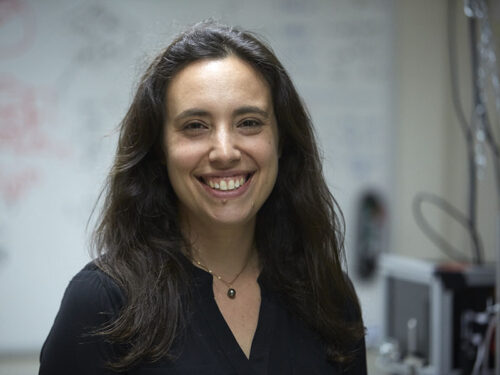
Date: October 6, 2022
Time: 12:30 p.m. - 1:30 p.m.
Location: Maeder Hall Auditorium and virtual over Zoom
“Reducing the Energy Costs of Chemical Manufacturing: Bioinspired Light-Escalated Chemistry (BioLEC)”
Gabriela Schlau-Cohen
Associate Professor of Chemistry, Massachusetts Institute of Technology
Abstract
The search for more efficient, cost-effective, and green manufacturing technologies is of paramount importance as global energy demands continue to increase. Chemical manufacturing alone accounts for 10% of total global energy consumption and is responsible for 7% of the world’s greenhouse gas emissions. Fossil fuels remain the most widely employed source of energy to generate the high temperatures and pressures required, even though solar energy is an attractive alternative. The key setback is not the lack of solar energy, but the means to utilize and convert this power in useful ways. Light-driven chemistry has the potential to revolutionize the chemical industry as it provides alternative reactivity pathways using photocatalysts that lead to the formation of products that are either unattainable or energetically costly through traditional routes.
Bioinspired Light-Escalated Chemistry (BioLEC) is a center funded by the Department of Energy to combine light harvesting and advances in solar photochemistry to produce energy-rich feedstock chemicals. A major thrust within BioLEC is the use or emulation of biological systems for improving catalyst systems. For example, in photosynthesis, light capture and reactivity occur in separate proteins and have been separately optimized by evolution. Inspired by this modular architecture, we introduced a light-harvesting element onto a photocatalyst to bypass the need of many traditional catalysts for high energy excitation. In test reactions, the presence of light harvesting enhanced product yields by an order of magnitude and introduced reactivity even under low energy excitation. These improvements establish the ability of bioinspired design to produce the next generation of efficient and effective photocatalysts. In this talk we will review the energy and environmental issues that led to the creation of BioLEC, how we have tackled energy challenges with our multidisciplinary team, the key major advances we have achieved, and our plans for the future.
Bio
Schlau-Cohen is an Associate Professor in the Department of Chemistry at MIT. She received a B.S. in Chemical Physics from Brown University in 2003 and a Ph.D. in Physical Chemistry from the University of California, Berkeley in 2011, where she was an AAUW American Fellow. She was then a CMAD Postdoctoral Fellow at Stanford University. In 2015, she joined the faculty of MIT. Her research group uses single-molecule spectroscopy and ultrafast spectroscopy to explore the energetic and structural dynamics of biological and bio-inspired systems, particularly photosynthetic light harvesting. Schlau-Cohen’s work has been recognized with awards including the American Association for the Advancement of Science Marion Milligan Mason Award, the American Chemical Society Pure Chemistry Award, and the Biophysical Society Margaret Oakley Dayhoff Award.
All seminars are held from 12:30 p.m. to 1:30 p.m.
Lunch is provided at 12:00 noon.
Visit acee.princeton.edu/highlight-seminar-series for more info.